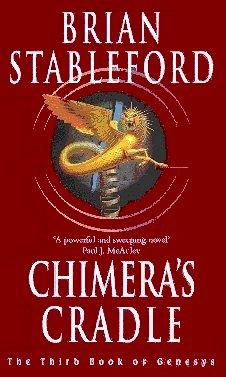| Home |
| Novels |
| Collections |
| Translations |
| Non-Fiction |
| Short Stories |
| Anthologies |

Andris Myrasol, Princess Lucrezia and their companions are now spread widely across the face of the world. Yet they all struggle towards the area known as Chimera's Cradle, facing ridiculous odds in order to solve the mysteries that led to their journey, so many months ago. The Chimeras themselves, amazing as they appear to be, are the least of the wonders that will be encountered upon this final journey, which will lead various of the travellers to death, knowledge and transformation.
SCIENCE FICTION CHRONICLE has called this series 'The kind of major storytelling event that comes around all too seldom in SF'. Now, every reader will see just how true that is, as they join the adventurers on their final journey.
Cover art by Mark Salowski. Cover design by Slatter-Anderson
Published
in 1997 by Legend.
ISBN: 0-09-944371-6

With Chimera's Cradle Brian Stableford brings the acclaimed book of Genesys to a stunning and unexpected climax.
Andris Myrasol, Princess Lucrezia and their companions are now spread widely across the face of the world. Yet they all struggle towards the area known as Chimera's Cradle, facing ridiculous odds in order to solve the mysteries that led to their journey, so many months ago.
The Chimeras themselves, amazing as they appear to be, are the least of the wonders that will be encountered upon this final journey which will lead the travellers to death, knowledge and transformation.
'Stableford seems to be redefining the genre in a big way' SFX
Published in 1997 by Orbit.
ISBN:1-85723-636-X

